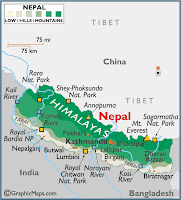Anyone else old enough to remember talking about the Twilight Zone? Where time tilts and wiggles, and the perceived immutable and immovable limitations of the universe no longer apply? Where things happen that we mere plodding mortals never thought were possible?
But then perhaps I had gone to the Twilight Zone. Or we all have. For there on the front page of The Kathmandu Post was astonishing news. China and Nepal had resolved their decades long dispute about the height of Mount Everest.
According to a senior official at Nepal's Department of Surveys, "The Chinese side -- led by Li Qingyuan -- accepted Nepal's claim that the snow height of Mount Everest is 8,848 metres, while the Nepali side recognized the Chinese claim that the rock height of the mountain is 8,844.43 metres."
Reading this on the front page of The Kathmandu Post, I experienced the unbearable lightness of hope. If China and Nepal had figured out how to settle the height of Mount Everest, they had obviously changed the way they went at settling disputes. Perhaps they can be induced to share their new ways with the rest of us, among whom it's become more fashionable to fan a dispute's flames than to settle it. Who knows? If these new ways can work out the height of Everest today; tomorrow they might work out world peace!
 Of course nothing lasts forever, even the agree-upon height of Mount Everest. The further articles I read yesterday about this momentous settlement often went on to anticipate that future complications to the Everest situation could be expected in a few million (or was it billion?) years. Complications, sadly, that that are beyond China's and Nepal's control
Of course nothing lasts forever, even the agree-upon height of Mount Everest. The further articles I read yesterday about this momentous settlement often went on to anticipate that future complications to the Everest situation could be expected in a few million (or was it billion?) years. Complications, sadly, that that are beyond China's and Nepal's control It is my understanding that the the Himalayan Mountains, of which Everest is a part, formed as tectonic forces drove two continental plates (the Eurasian and the Indian) toward each other.When these plates collided, up popped the Himalayas. Interestingly, it seems that these plates are still having at each other, geologically speaking, and so Everest is still probably growing.
Which means the rock of the world's tallest mountain is mostly likely getting taller.
In contrast, however, the snow side is probably getting shorter. Temperatures on Everest, like most places, seem to be warming.
Life just never sits still, does it?












No comments:
Post a Comment